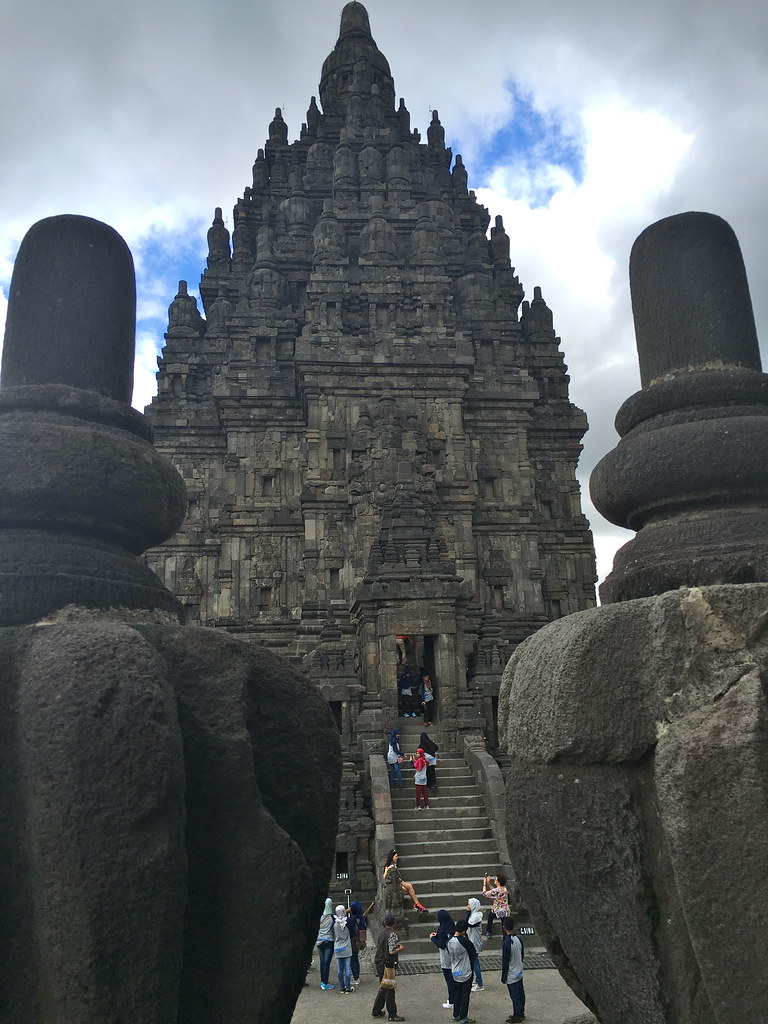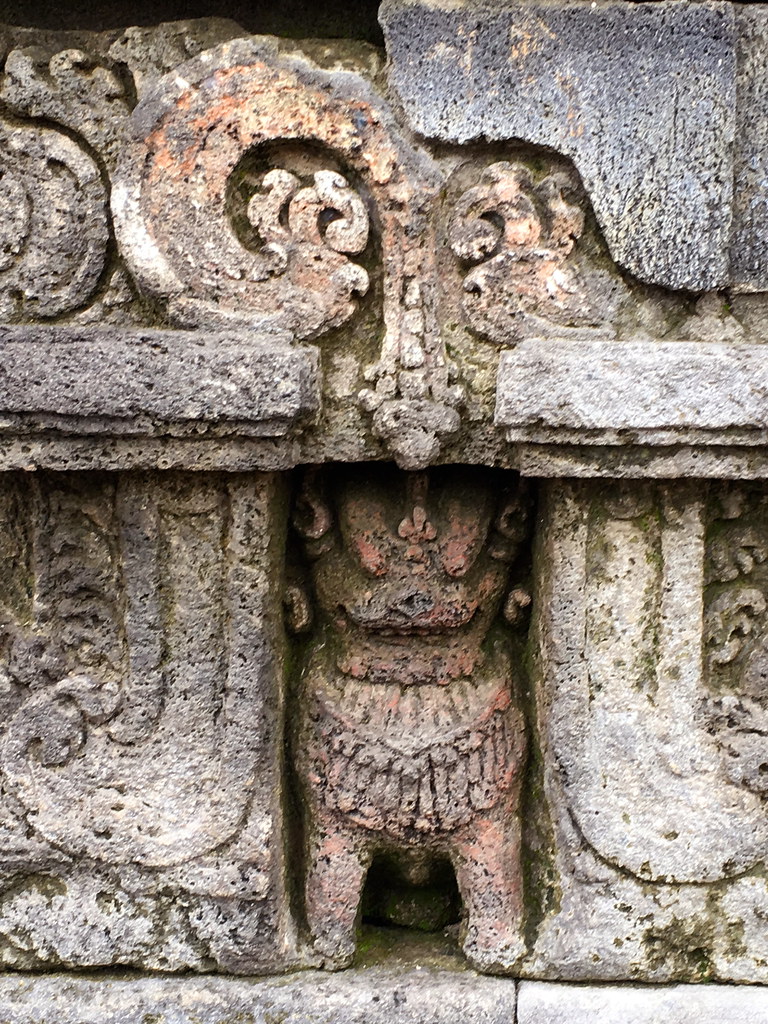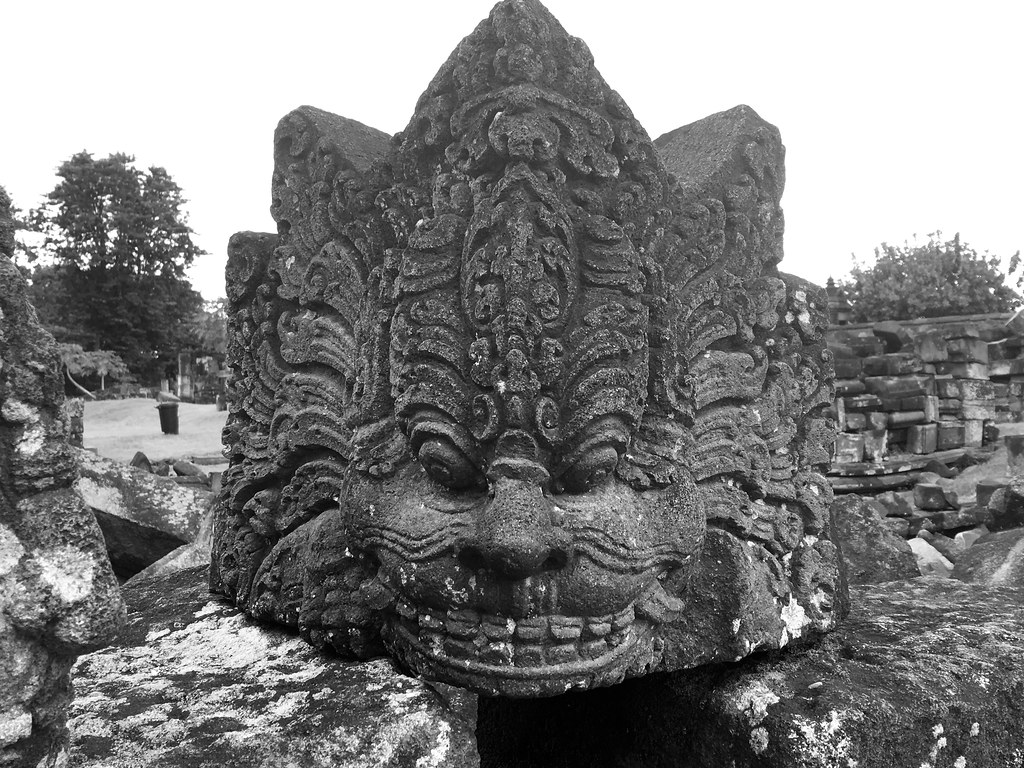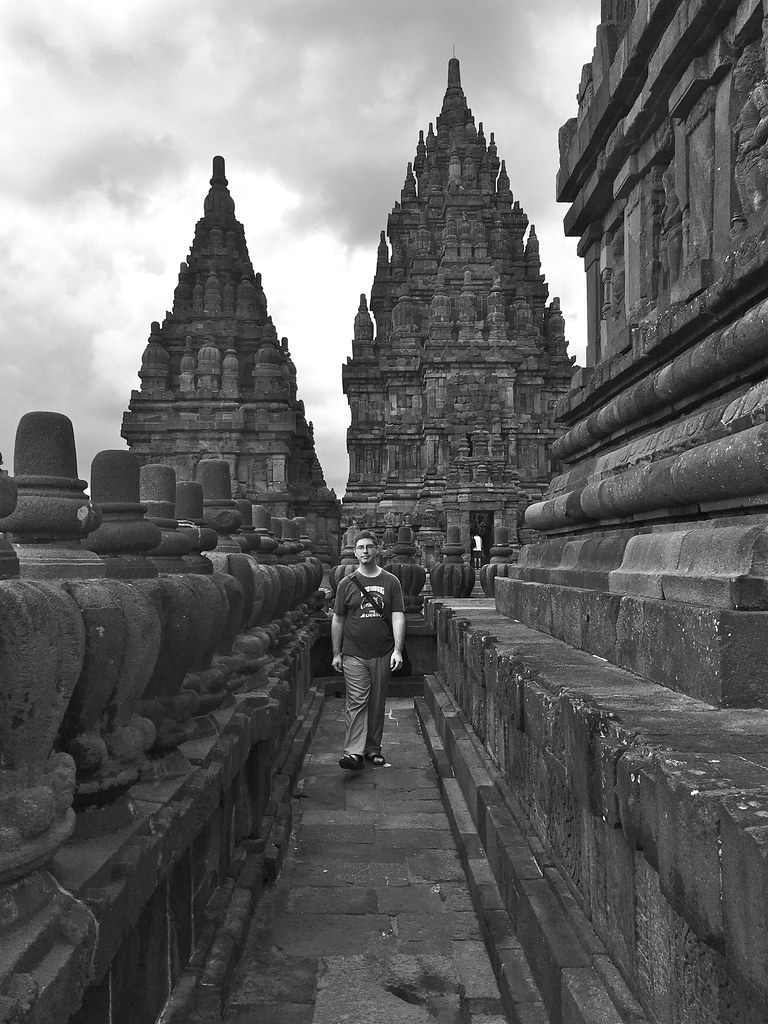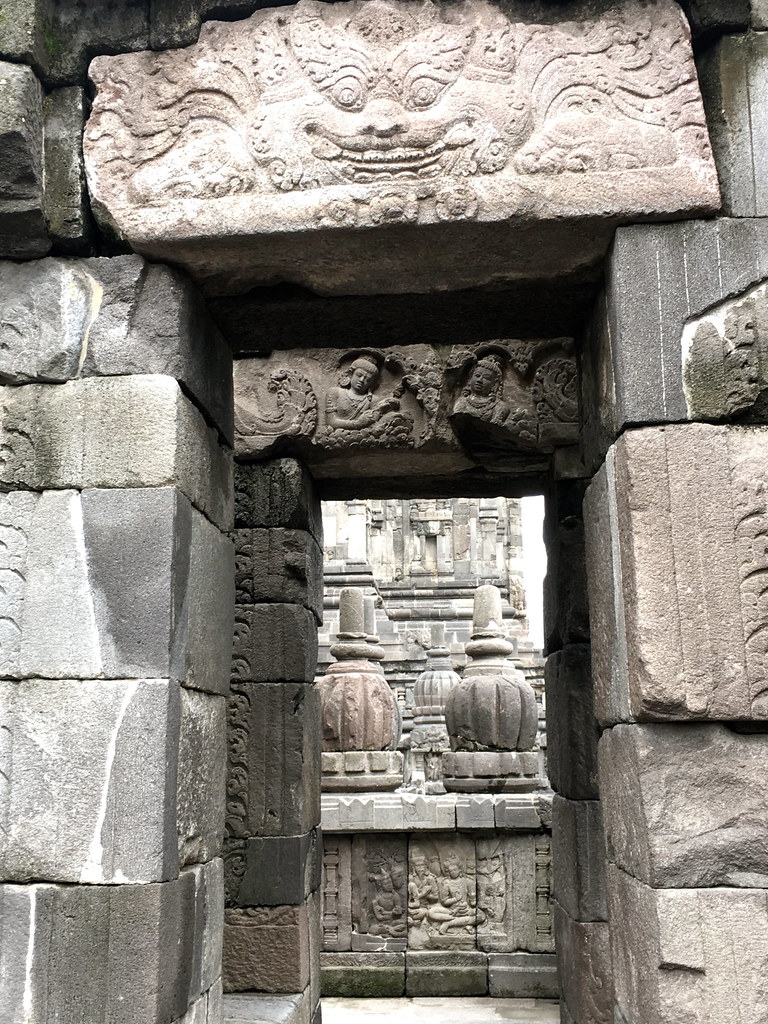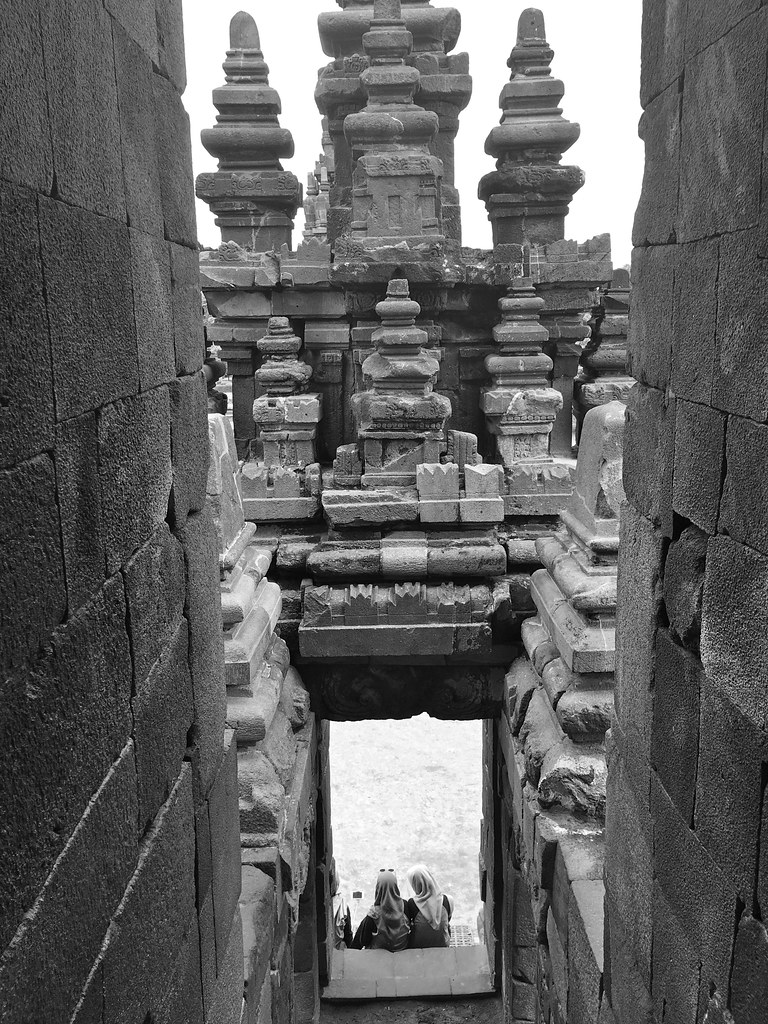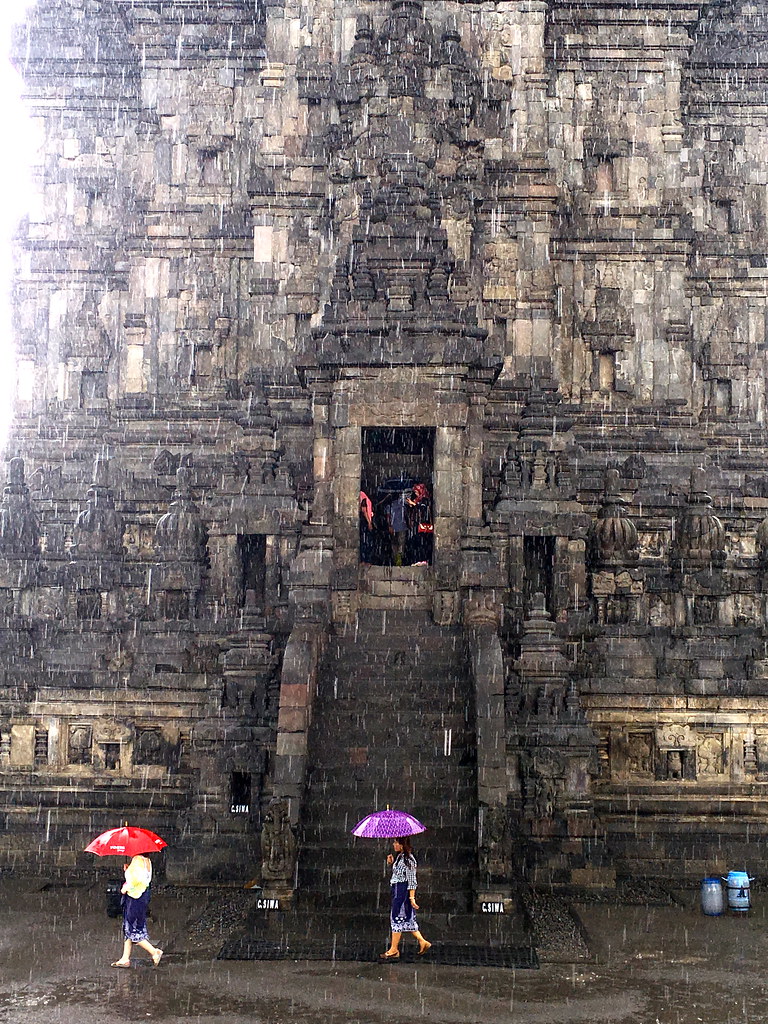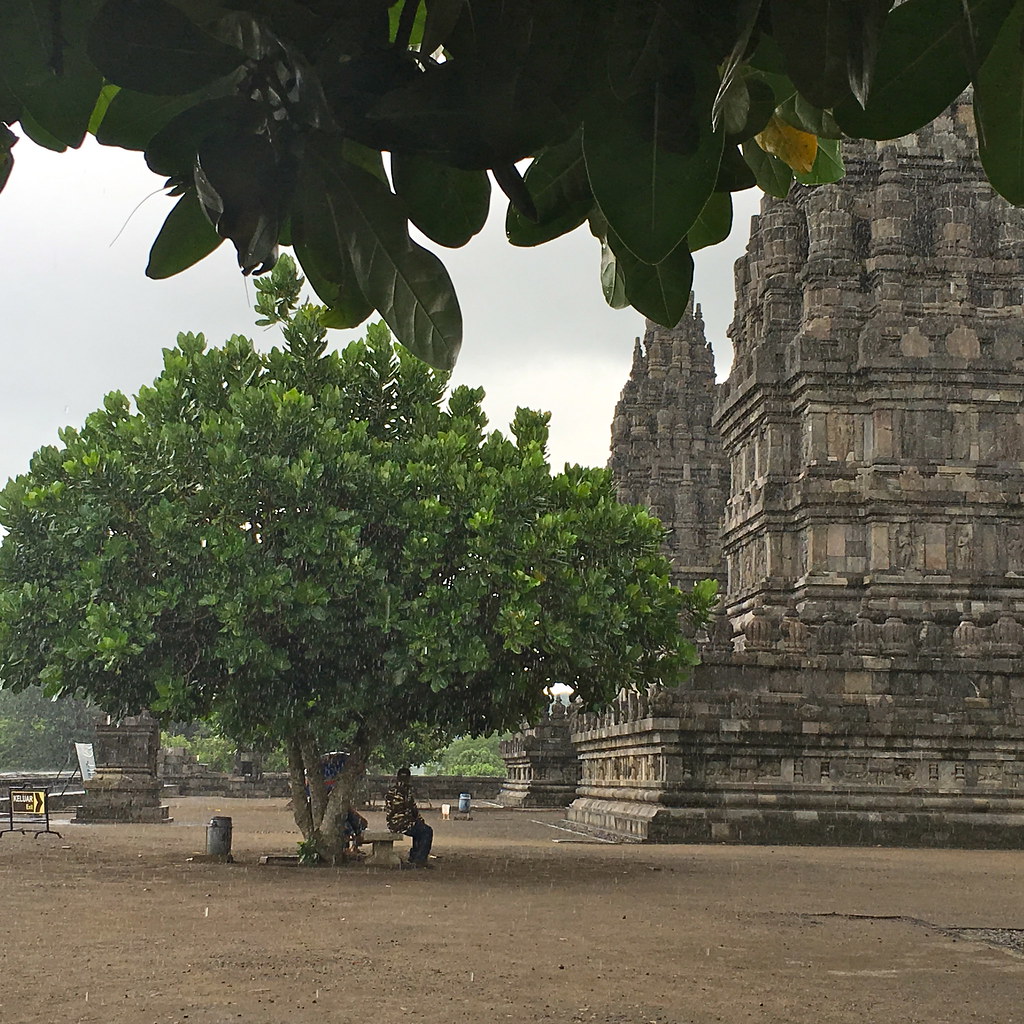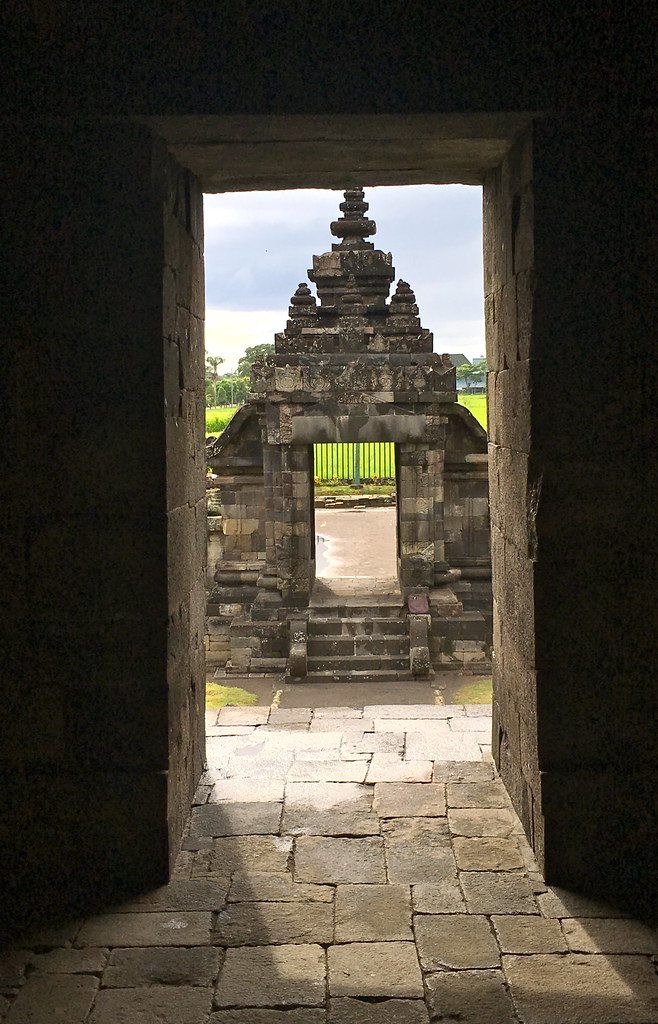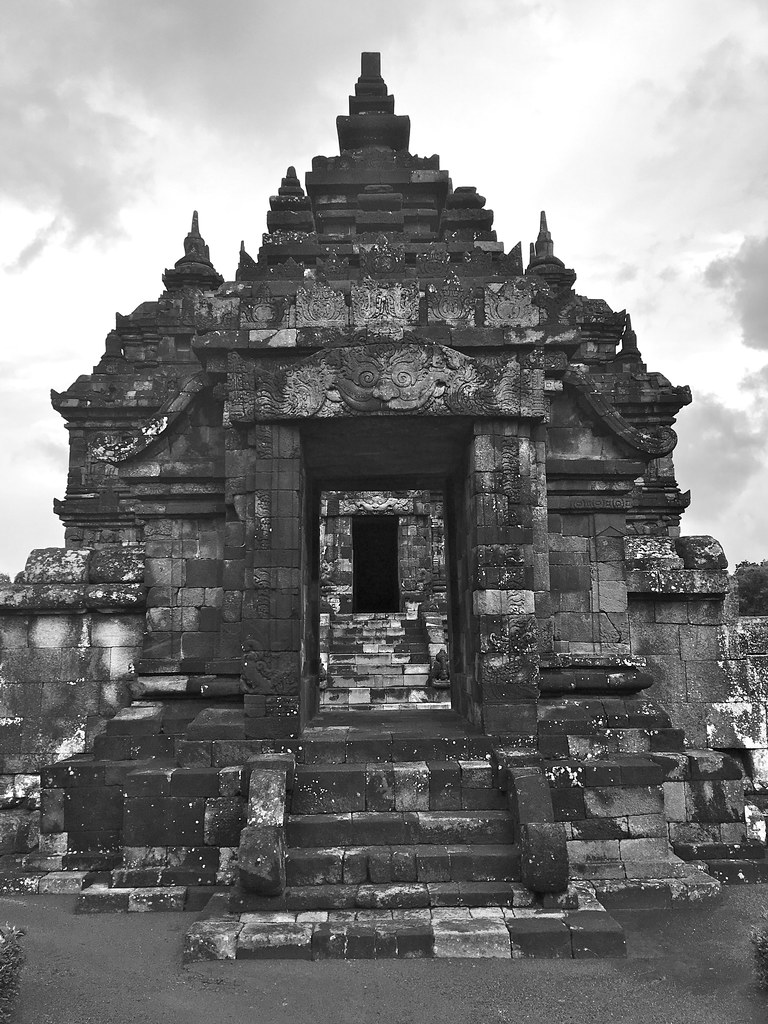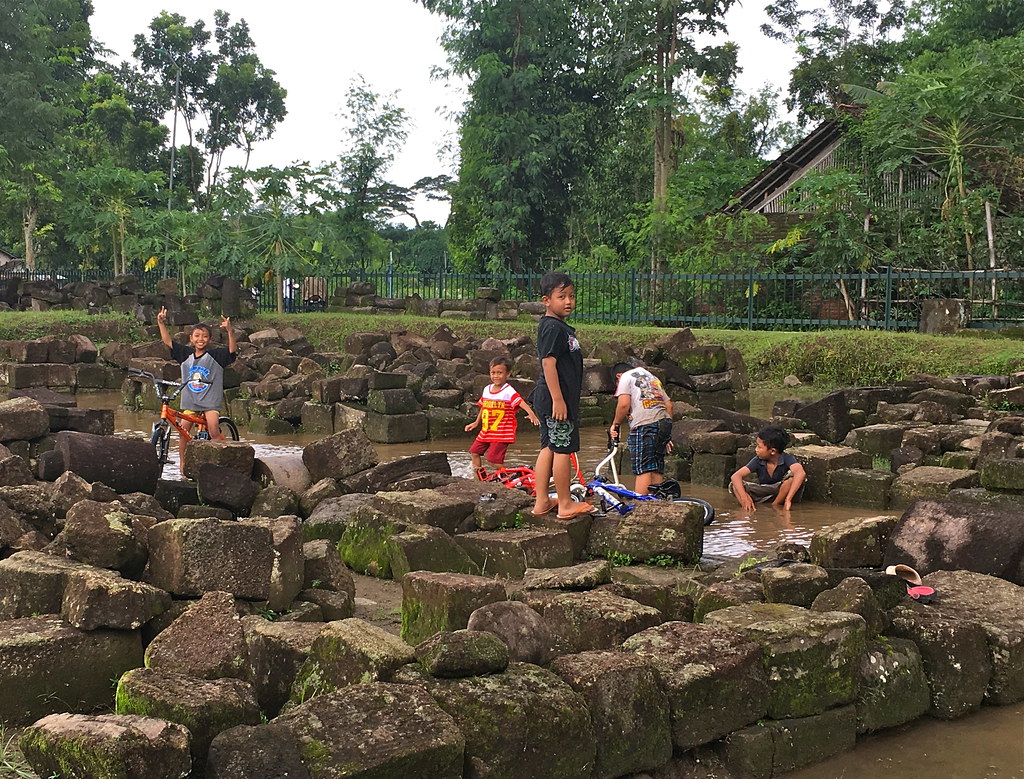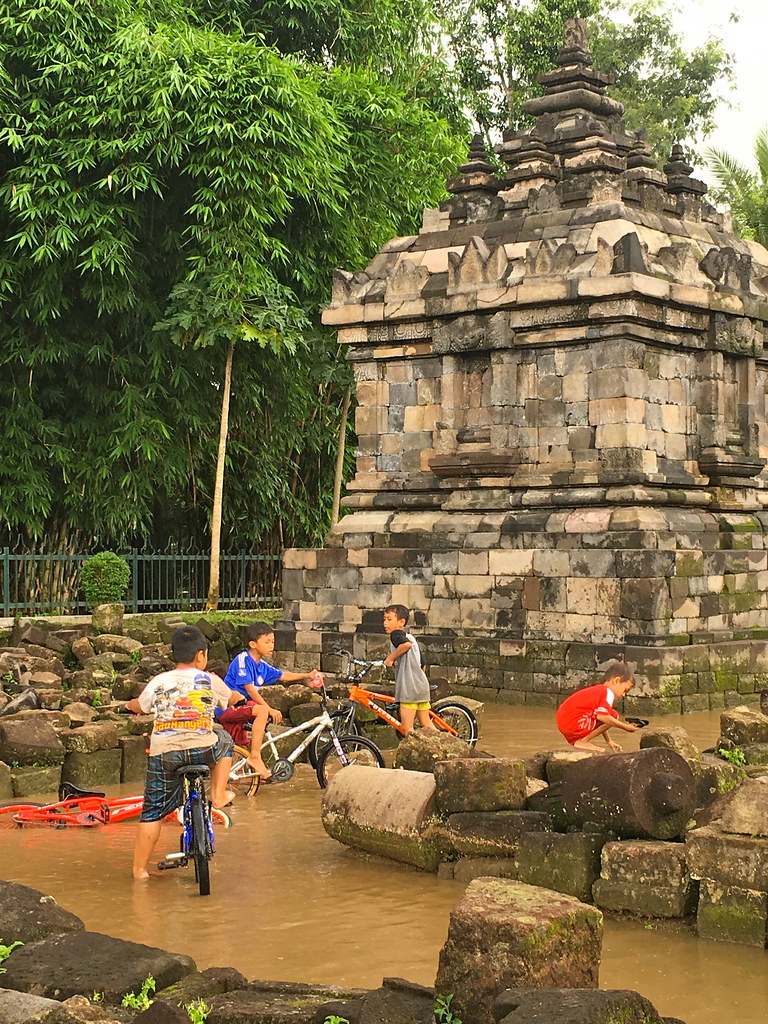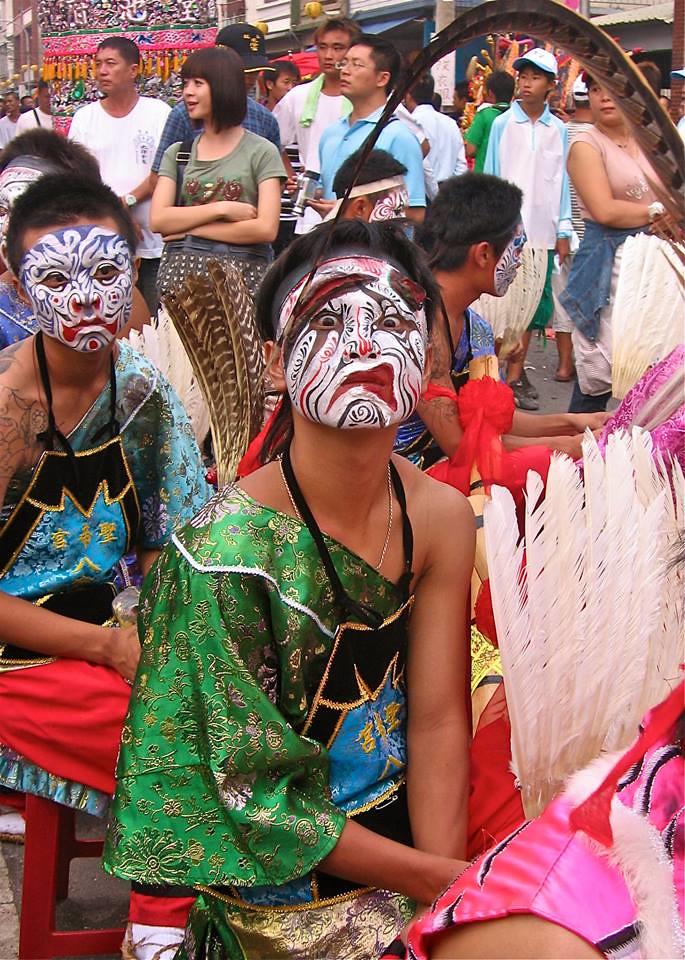 |
| "Wang Ye" in full makeup at the opening of the Donggang King Boat Festival |
Anyway, why does it always have to be hot springs, a few Taipei hot spots, maybe Sun Moon Lake and Taroko if you're lucky, and "theme restaurants"? Maybe these days Kenting will figure in on these "itineraries". I'm sick of it too. While I could recommend a few great hot springs and I've even been to that toilet restaurant (verdict: mediocre. Were you surprised?), I feel like one could do a much better job talking about great places in Taiwan than "Taipei 101 and this lake I hear about in the mountains". Not Taipei, Taiwan.
So, in no particular order and with no particular rhyme or reason, here are some of my favorite places in Taiwan. With links, mostly to my blog, because I'm nothing if not self-promoting.
This has to have been one of my favorite trips in Taiwan that was not an outlying island. The area around Gangzai and south toward the east end of Kending is gorgeous. There are people who go to Gangzai, a little strip of a town along the thin road down the coast that peters out a few kilometers to the south, just to enjoy a Taiwan without convenience stores. I actually like convenience stores, but I also appreciate the quiet rural peace of towns like this.
From here, if you have a car, you can drive around sand dunes (or just walk on the beach), drive up to some grasslands with great views of the mountains and sea, listen to waves make rain sounds on a pebble beach to the north, hike to the ruins of an aboriginal village, hike along the coast to a shipweck and be within a short drive of some of Kending's best coastal scenery and beaches. Plus, it means you can see the beauty of Kending without ever going to Kending town. Win-win, because Kending town sucks butt. Loud, crowded, dirty tourist trap with a crappy crowded beach and literally nothing to recommend it.
As a confirmed driving-hater, I can say that the driving isn't even that hard, I was okay with it.
I'll wait on a link in the heading until I blog my latest Tainan adventures, as recently I managed to visit Tainan not once, but twice in the span of a few months. However, I'd been there several times before, though not with as good photographic results.
Tainan is the city of my heart. It's where Brendan and I decided to start dating and was one of my first (successful) forays outside of Taipei when I was still fresh off the plane in 2006-2007. If I could do my job there - I can't - and it had better public transportation, or really any public transportation, I would move there.
I love it not only for the huge variety of temples of all sizes, backgrounds and ages, but also for it's laid-back urban vibe. It's a city, but not a frenetic one (I'd say "like Taipei" but I actually think Taipei is pretty laid-back too). I love it for the many varieties of ice cream and shaved ice available to cool yourself in the tropical heat, I love its "we're as hip as Taipei, or maybe even hipper" cafes and its nascent young, artsy vibe. I love eating fresh fruit ice cream in a melon at Taicheng Fruit Store and drinking coffee at Narrow Door and Taikoo. I love Tainan shrimp roll rice. I love Tainan's pro-independence politics.
I could chill in Tainan forever.
I don't have links yet as I haven't blogged our Yunlin trip, so here are some from my friend over at Synapticism. You won't find a more traditional-yet-almost-completely-uncommercialized place than Yunlin County and its assorted towns. If you want to see where your Taiwanese friends' grandparents all come from, check it out.
Yunlin is another good place to chill, without any major must-sees except, perhaps, Beigang's Chaotian temple. I liked the old-school flavor of Beigang, enjoyed the unique "old street" buildings in Xiluo, whose old street hasn't become too commercialized yet, and finding (more than one!) funky cafe in Douliu as well as a temple to both a Daoist god (I think Guan Di) and Confucius and a truly uncommercialized old street. We didn't get to stay in Huwei but I would be interested to go back - the downtown area looks bustling, with some interesting old architecture, and there's a puppet museum. You could spend about half a day in any given town - more if you are content to explore for half a day and spend the rest of it in a cafe chilling out until dinner, which I generally am - and although there may be a long wait for a bus, transit between the towns is otherwise fairly quick and easy. Downtowns are pretty compact, you only need independent transport if you want to get way out into the countryside, which is a plus.
Anyway, watch this space - I'll be doing a longer post on this very soon.
This is one of my favorite places in Taiwan. There is not that much to do in Lishan itself - though exploring the abandoned church and the old Lishan Hotel (which I understand may have been finally renovated and reopened?) will give you a reason to get out and just enjoy the views. Or, you could just walk around and enjoy the views! This is a trip you will want a car for, or some way of obtaining independent transportation. With it, you can visit Fushoushan and Wuling farms during the day, and then drink tea outside back in Lishan town as the sun sets (if you get a good honestay or hotel, that is). If you can score a ride to Fushoushan, after exploring up there it's not hard to hike back down to town and, again, the views are breathtaking. It's a fantastic place to go to just relax, with clean air and some of the most stunning mountain scenery in the country. If you're thinking "I want to hang out in the mountains, but still be able to walk to a few restaurants and places to buy essentials", Lishan is for you.
I don't have a lot of photos from the first trip, as I was more concerned with making sure Emily (who was driving) knew where she was going. So, most of those pics are from our drive the next day down the east coast. My second trip concentrated on Lalashan and Shangbaling, not the whole highway. But, the drive is lovely and in many places, wild. You end up in the same place that the Central Cross-Island drops you off if you take the Yilan route (there is also a Hualien route, which I have not done). Some of the driving, along one-car-at-a-time roads clinging to mountainsides, can be a bit intense, but it's absolutely worth it. Daxi, Fuxing and Xiao Wulai, with its lovely little waterfall and - more interestingly, hike to the lovely little waterfall - are also good places to stop. Yes, I've been to Cihu - I took my in-laws there, which I think my history buff father-in-law enjoyed - but never blogged about it.
The point? Between Daxi, Cihu, Fuxing, Xiao Wulai, Shangbaling and, at the other end, Mingchih Forest Recreation Area, you'll be pleasantly surprised by all there is to see and do along the highway. Or, just drive along and enjoy the mountain views.
Poor Puli. First the earthquake, and now it just doesn't get that much love from international tourists. If people go there at all it's to catch a bus to Sun Moon Lake. But Puli saved my butt during a particularly horrid Chinese New Year camping trip: see link above, also, don't try to camp in the mountains of Taiwan on Chinese New Year. You can thank me later for that bit of advice. For that, I will always be grateful. The Shaoxing wine brewery is interesting enough, I liked making a little paper fan at the paper factory, I still have the tray I bought at the lacquer makers', and if you're not into that sort of tourist-trail 'handicrafts and local goods' stuff, rent a bike, get out of town and enjoy the views as the Central Mountain Range rises from the plain. Also, within a short drive is the "where is that?" town of Caotun. I can't say there's that much to do in Caotun, but there is one very cool temple that looks like a medicine gourd (慈德宫) perched on a hill out of town. It's way more interesting than the - in my opinion - creepy-seeming Zhongtai monastery.
After a soporific drive through bucolic tropical beauty, with a stop to see some Formosan macaques which may or may not take over your car, you'll be greeted with Hawaii-like views of the sea as you hit the coast at Donghe. Stop for a break at the cafe above Jinzun beach (and absolutely do take the stairs down to the near-deserted beach, though I'm not sure I'd recommend swimming) but otherwise enjoy the Hawaii-Five-O drive down to Taidong. There are a few other places you can stop at on the way, including the expat enclave of Dulan. We didn't stay long, but we did pick up some locally-brewed beer for later.
Beipu has become something of a tourist stop, but Pasta'ai, if you can finagle the dates for the biennial Saisiyat aboriginal harvest festival, is still a very local thing. As long as you are respectful and friendly and willing to drink a crapton of millet wine, foreign guests are welcome. That said, it's not nearly as commercialized (or really commercialized at all) as its sister festival in Nanzhuang. Don't forget Zhang Xueliang's house and a worthwhile hike over Lion's Head Mountain. The temple on the Miaoli end gets all the press, but I actually liked the old Japanese baroque temple on the mountain itself.
Hukou is, well, an old street. But it's a quiet one, without the same-old-same-old souvenir shops that plague Sanxia, Jinshan, Shenkeng and Daxi. It's pretty far out of town and bus service is sporadic, so you will want to either drive or arrange taxis. Being folks who dislike driving, we did the latter.
Hsinchu city is also worth your time, with some interesting historical sites, good food, a city god temple and the absolutely amazing - not really in a good way - temple to late mass murderer, brutal dictator and all around asshat Chiang Kai-shek, which has got to be one of the most mind-blowing historical things I've seen in Taiwan. Not because the temple itself is particularly special, but for what it represents.
Long and short of it? There's a lot to do in Hsinchu.
I cannot believe I've been to Kaohsiung city at least three times and yet never really blogged much about the city itself. (Edit: here you go!)
That said, enjoy this post about the Batman room at the Eden Exotic Love Hotel in Kaohsiung.
Anyway, I was there for a weekend last month so I'll be fixing that soon. Yes, there are all the things you've heard about: Pier 2, wandering around Hamasen, the British Consulate at Takao (I like to go for the views, that's about it really), Cijin Island, Chaishan and its monkeys, Lotus Lake, Love River, the sugar refinery (which is now a family-friendly tourist spot), Liuhe Night Market. With the exception of the night market, all of this stuff is fine - well, the sugar refinery was a bit bland - and I enjoy it too. By all means, go. Especially Cijin Island, which has great seafood and a fun ferry ride to get you there. I am also a fan of the Dome of Light in Formosa Boulevard station, and in a hallway just off of it, a man who makes sterling silver flower pendants, rings and other charms.
But I like Kaohsiung for its great coffee and food scene, including some fantastic hangouts like Beast (try the sweet potato and cheese quesadillas and Cambridge Cucumber 'mojito'), Reve Coffee and Sojourner Cafe, great burgers at Zzyzx, Takao Beer, a particular cafe on Chaishan that I enjoy, and tons of great local food. I like that it has an MRT so I don't have to taxi everywhere, as I won't rent a car in such a large city. I like Ruifeng Night Market, crowded with locals but almost unknown to tourists. I like hanging out with my friend Sasha in Dashe and eating a whole chicken, gorgeously cooked before walking up Guanyin Mountain.
I'm including Donggang in here because it's a perfect day trip from Kaohsiung. I haven't been to the nearby aquarium, but I can heartily recommend dinner at the harbor (best seafood in Taiwan without going to the outlying islands), Donglong Temple and its magnificent golden gate, a quick walk down the old street, and - again if you can figure out the dates - its King Boat Festival, held every three years, which is worth visiting both at the beginning and the end. Quite possibly the best cultural festival in Taiwan. I wrote my first ever published nonfiction story about it, and you should definitely buy the anthology in which it appears.
Another good choice near Kaohsiung? Meinong. Pretty on-the-tourist-trail, but nice.
...including Yuemeikeng in Jiaoxi (I couldn't make this a favorite considering what happened the second time we went).
There are several hiking trails up here - Yuemeikeng, Caoling Old Trail, Wankengtou and the Taoyuan grasslands (accessible from Caoling Old Trail), and Paoma (Running Horse) Old Trail to name a few. The views? Spectacular. Ever wondered what it was like to walk along a ridge of seaside cliffs with rolling hills to one side and a sheer drop to the waves below at the other? Well, this is it. Probably my biggest "don't miss" set of hiking trails in the entire country.
No, really, I love hanging out in Keelung. From Heping Island to Miaokou Night Market to the Fairy Cave Temple to Ghost Month, I always enjoy a reason to pass through this - to be honest - kinda grotty town. It's still got the old red light district "welcome sailors!" feeling, it's a bit rough around the edges (okay, at times very rough around the edges) and packed with pachinko parlors, but that's what makes it interesting.
Also, a great stopping-off point from trips to Jiufen and Jinguashi (which are nice, but packed with tourists - for good reason) and my favorite hot springs in Jinshan (in the old Japanese governor-general's hot spring getaway on the coast). Also, a good place to eat after a half day hike up Xiaotzukeng to Jiufen.
I don't think I have to sell you on Orchid Island (Lanyu) but I'll try anyway. Lanyu is unlike anywhere else in Taiwan. The locals don't put much stock in a cash economy - in that I saw locals freely using the services of their neighbors' businesses without paying because it all comes back eventually - though as an outsider you'll have to pay. Where kids run around and are supervised by whomever happens to be nearby, including when they run into the ocean. Where people paint traditional fishing boats by the side of the road. The language sounds more like an offshoot of Tagalog than anything you'll hear on Taiwan's mainland. It's one of the few places in Taiwan where you can speak Chinese to locals, but it will feel most definitely like two non-native speakers communicating. It's a place where you can completely and utterly chill out, a tiny (but sadly beachless) Hawaii with good snorkeling and out-of-this-world seafood (try the flying fish barbecue with a pitcher of ice cold Taiwan Beer). It's easy to drive or scooter around as there is one road (two if you count the one that runs up the middle of the island and connects at two different ends of the circle road).
I don't mean to exoticize it that much, I just want to make really clear that Orchid Island is not only nothing like anything you'll find elsewhere, it's also nothing like you'll find in Taiwan proper. It is unique. Don't miss it.
Being hard to get to due to near-constant fog that tends to ground flights, and its relative distance from Taiwan, most tourists give Matsu a miss. This is a mistake. I don't know what I was doing with my life before I discovered lao jiu mian (thin noodles with seafood cooked in a broth flavored with aged local wine). "Juguang Hamburgers", a sort of sesame-covered bread filled with a seafood filling that appears to be mainly chopped oyster remains one of my favorite foods. The old stone villages and winding paths through granite cliffs and dry, but humid coastlines evokes the Greek Isles or Turkey (in fact the houses reminded me very strongly of older settlements in Turkey). We stayed in Taiwan and yet felt like we'd taken a foreign vacation.
I love the old Ding family home (丁家老宅) with its coffee shop in a side hall. I love the old buildings on Zhongshan Road. I love the old street and its cafes in restored houses. I love the festivals at the Matsu temple. I love the old Longshan Temple at the other end of town. I love fried oysters. Hate me if you must, but I love Lugang and I am not afraid to admit it.
Southeast Pingdong County and East of Kending
This has to have been one of my favorite trips in Taiwan that was not an outlying island. The area around Gangzai and south toward the east end of Kending is gorgeous. There are people who go to Gangzai, a little strip of a town along the thin road down the coast that peters out a few kilometers to the south, just to enjoy a Taiwan without convenience stores. I actually like convenience stores, but I also appreciate the quiet rural peace of towns like this.
From here, if you have a car, you can drive around sand dunes (or just walk on the beach), drive up to some grasslands with great views of the mountains and sea, listen to waves make rain sounds on a pebble beach to the north, hike to the ruins of an aboriginal village, hike along the coast to a shipweck and be within a short drive of some of Kending's best coastal scenery and beaches. Plus, it means you can see the beauty of Kending without ever going to Kending town. Win-win, because Kending town sucks butt. Loud, crowded, dirty tourist trap with a crappy crowded beach and literally nothing to recommend it.
As a confirmed driving-hater, I can say that the driving isn't even that hard, I was okay with it.
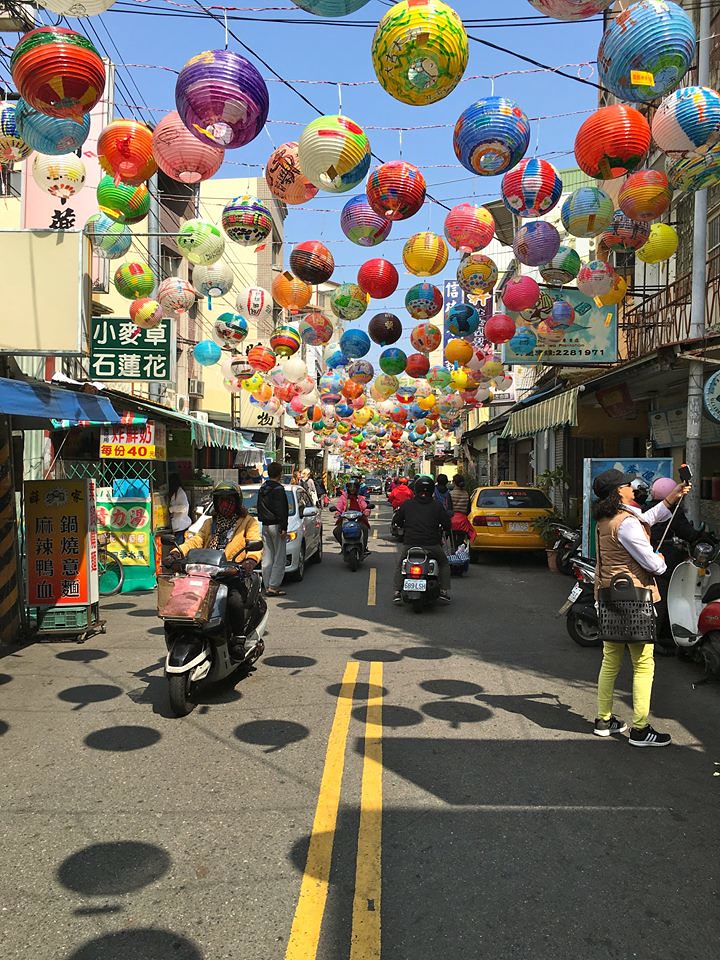 |
| Downtown Tainan |
Tainan is the city of my heart. It's where Brendan and I decided to start dating and was one of my first (successful) forays outside of Taipei when I was still fresh off the plane in 2006-2007. If I could do my job there - I can't - and it had better public transportation, or really any public transportation, I would move there.
I love it not only for the huge variety of temples of all sizes, backgrounds and ages, but also for it's laid-back urban vibe. It's a city, but not a frenetic one (I'd say "like Taipei" but I actually think Taipei is pretty laid-back too). I love it for the many varieties of ice cream and shaved ice available to cool yourself in the tropical heat, I love its "we're as hip as Taipei, or maybe even hipper" cafes and its nascent young, artsy vibe. I love eating fresh fruit ice cream in a melon at Taicheng Fruit Store and drinking coffee at Narrow Door and Taikoo. I love Tainan shrimp roll rice. I love Tainan's pro-independence politics.
I could chill in Tainan forever.
Yunlin County
I don't have links yet as I haven't blogged our Yunlin trip, so here are some from my friend over at Synapticism. You won't find a more traditional-yet-almost-completely-uncommercialized place than Yunlin County and its assorted towns. If you want to see where your Taiwanese friends' grandparents all come from, check it out.
Yunlin is another good place to chill, without any major must-sees except, perhaps, Beigang's Chaotian temple. I liked the old-school flavor of Beigang, enjoyed the unique "old street" buildings in Xiluo, whose old street hasn't become too commercialized yet, and finding (more than one!) funky cafe in Douliu as well as a temple to both a Daoist god (I think Guan Di) and Confucius and a truly uncommercialized old street. We didn't get to stay in Huwei but I would be interested to go back - the downtown area looks bustling, with some interesting old architecture, and there's a puppet museum. You could spend about half a day in any given town - more if you are content to explore for half a day and spend the rest of it in a cafe chilling out until dinner, which I generally am - and although there may be a long wait for a bus, transit between the towns is otherwise fairly quick and easy. Downtowns are pretty compact, you only need independent transport if you want to get way out into the countryside, which is a plus.
Anyway, watch this space - I'll be doing a longer post on this very soon.
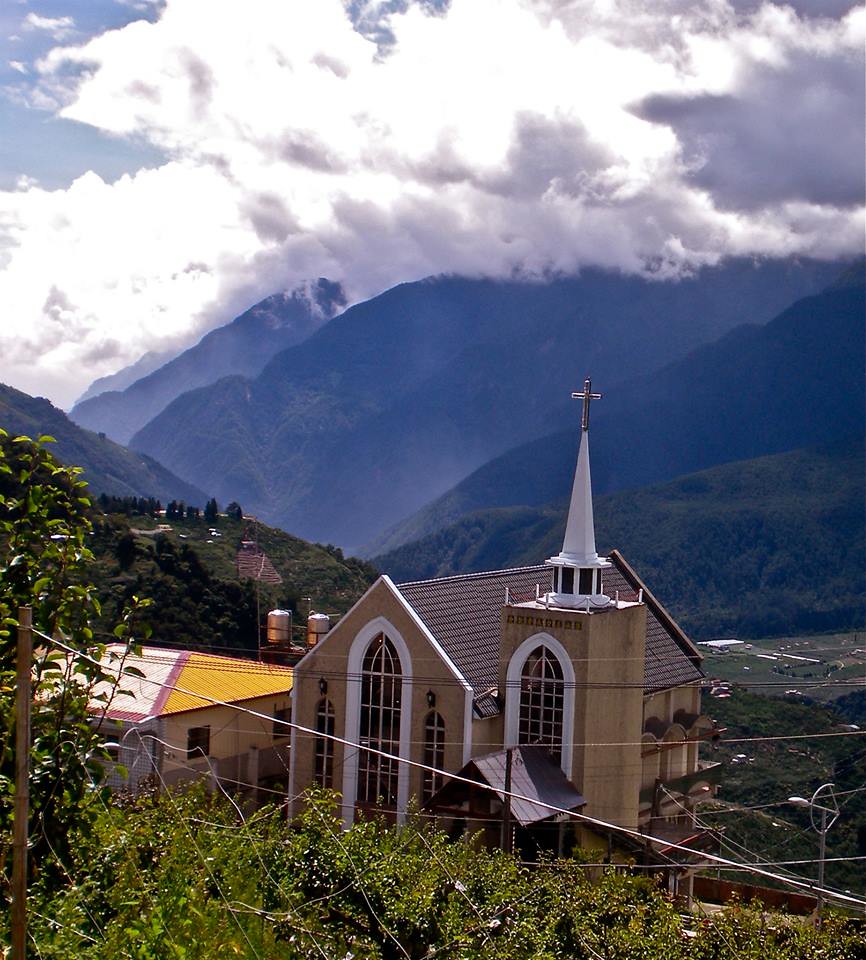 |
| The abandoned church in Lishan |
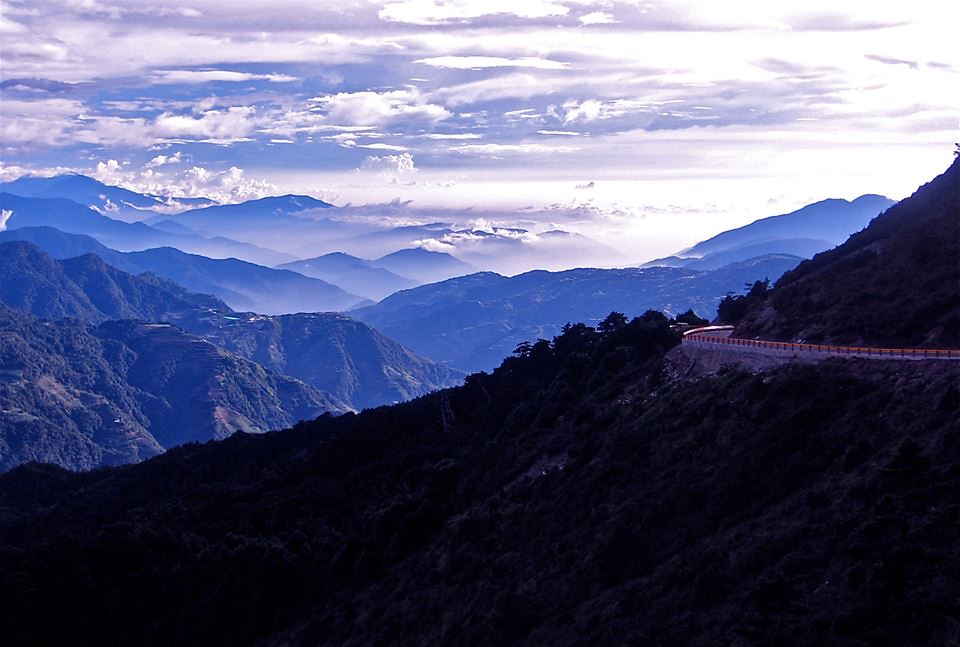 |
| The drive to Lishan from Hehuan Mountain |
In fact, the North Cross-Island is pretty rad, too
I don't have a lot of photos from the first trip, as I was more concerned with making sure Emily (who was driving) knew where she was going. So, most of those pics are from our drive the next day down the east coast. My second trip concentrated on Lalashan and Shangbaling, not the whole highway. But, the drive is lovely and in many places, wild. You end up in the same place that the Central Cross-Island drops you off if you take the Yilan route (there is also a Hualien route, which I have not done). Some of the driving, along one-car-at-a-time roads clinging to mountainsides, can be a bit intense, but it's absolutely worth it. Daxi, Fuxing and Xiao Wulai, with its lovely little waterfall and - more interestingly, hike to the lovely little waterfall - are also good places to stop. Yes, I've been to Cihu - I took my in-laws there, which I think my history buff father-in-law enjoyed - but never blogged about it.
The point? Between Daxi, Cihu, Fuxing, Xiao Wulai, Shangbaling and, at the other end, Mingchih Forest Recreation Area, you'll be pleasantly surprised by all there is to see and do along the highway. Or, just drive along and enjoy the mountain views.
Puli
Poor Puli. First the earthquake, and now it just doesn't get that much love from international tourists. If people go there at all it's to catch a bus to Sun Moon Lake. But Puli saved my butt during a particularly horrid Chinese New Year camping trip: see link above, also, don't try to camp in the mountains of Taiwan on Chinese New Year. You can thank me later for that bit of advice. For that, I will always be grateful. The Shaoxing wine brewery is interesting enough, I liked making a little paper fan at the paper factory, I still have the tray I bought at the lacquer makers', and if you're not into that sort of tourist-trail 'handicrafts and local goods' stuff, rent a bike, get out of town and enjoy the views as the Central Mountain Range rises from the plain. Also, within a short drive is the "where is that?" town of Caotun. I can't say there's that much to do in Caotun, but there is one very cool temple that looks like a medicine gourd (慈德宫) perched on a hill out of town. It's way more interesting than the - in my opinion - creepy-seeming Zhongtai monastery.
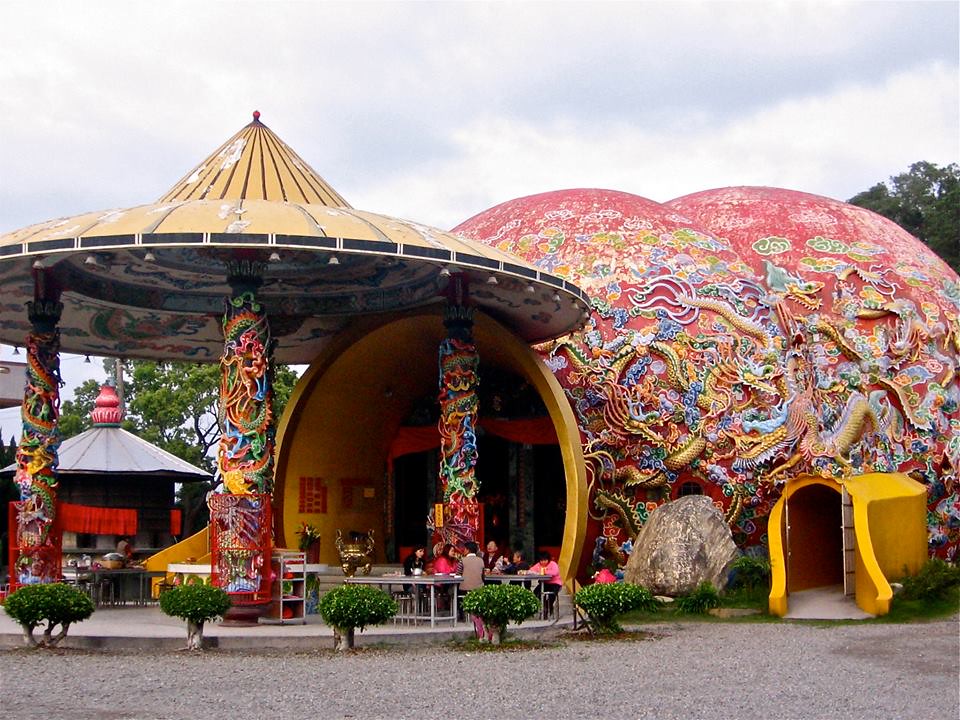 |
| The medicine gourd temple in Caotun (草屯慈德宫) |
The drive from Chihshang (East Rift Valley) to Taidong (the east coast)
This is actually an expat favorite, but still never makes it into those "Top Ten Things In Taipei That I Am Going To Pretend Are Representative of Taiwan" lists. Chihshang itself is lovely, if a bit full of local tourists because some famous commercials and movies were shot there. Nevermind, it's beautiful and worth a stop. It's in the heart of the East Rift Valley - which, gorgeous! - with views of bright green rice fields giving way to dark green mountains on both sides. Check it out, have a coffee at Lavazza - interesting, seeing as the town is famous for Lavazza competitor Mr. Brown's commercials, talk about a missed marketing opportunity - and head up over the eastern mountains to the coast.After a soporific drive through bucolic tropical beauty, with a stop to see some Formosan macaques which may or may not take over your car, you'll be greeted with Hawaii-like views of the sea as you hit the coast at Donghe. Stop for a break at the cafe above Jinzun beach (and absolutely do take the stairs down to the near-deserted beach, though I'm not sure I'd recommend swimming) but otherwise enjoy the Hawaii-Five-O drive down to Taidong. There are a few other places you can stop at on the way, including the expat enclave of Dulan. We didn't stay long, but we did pick up some locally-brewed beer for later.
Hsinchu County
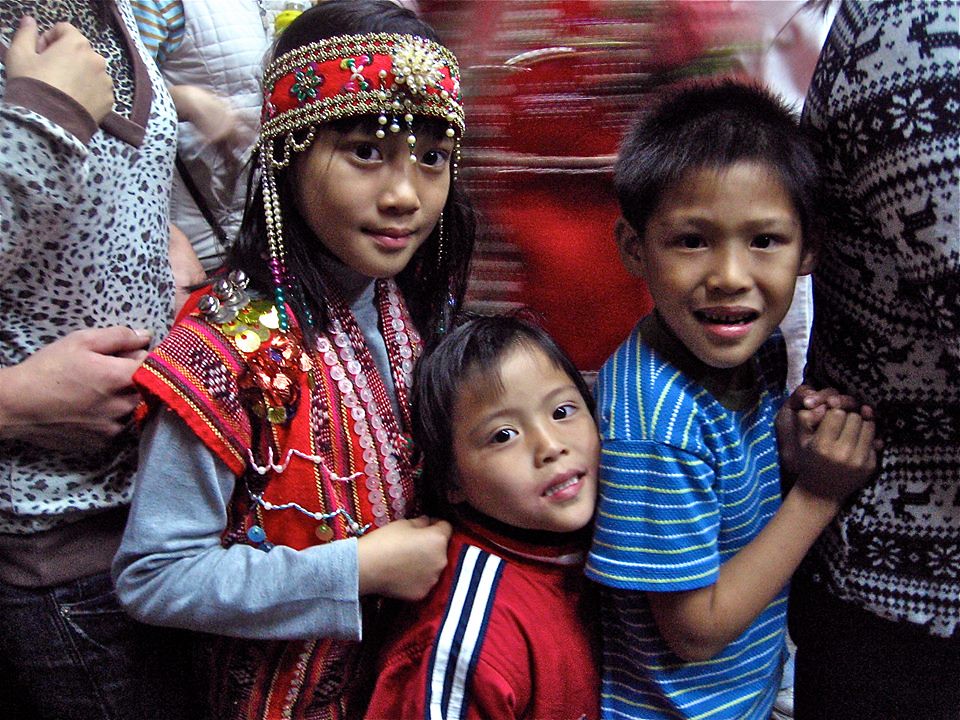 |
| Children at Pasta'ai in Hsinchu county |
I have a lot of links for Hsinchu, so have a look:
Pasta'ai in 2008 and 2010 (including a visit to the house of Zhang Xue-liang 張學良)
Pasta'ai in 2008 and 2010 (including a visit to the house of Zhang Xue-liang 張學良)
Beipu has become something of a tourist stop, but Pasta'ai, if you can finagle the dates for the biennial Saisiyat aboriginal harvest festival, is still a very local thing. As long as you are respectful and friendly and willing to drink a crapton of millet wine, foreign guests are welcome. That said, it's not nearly as commercialized (or really commercialized at all) as its sister festival in Nanzhuang. Don't forget Zhang Xueliang's house and a worthwhile hike over Lion's Head Mountain. The temple on the Miaoli end gets all the press, but I actually liked the old Japanese baroque temple on the mountain itself.
Hukou is, well, an old street. But it's a quiet one, without the same-old-same-old souvenir shops that plague Sanxia, Jinshan, Shenkeng and Daxi. It's pretty far out of town and bus service is sporadic, so you will want to either drive or arrange taxis. Being folks who dislike driving, we did the latter.
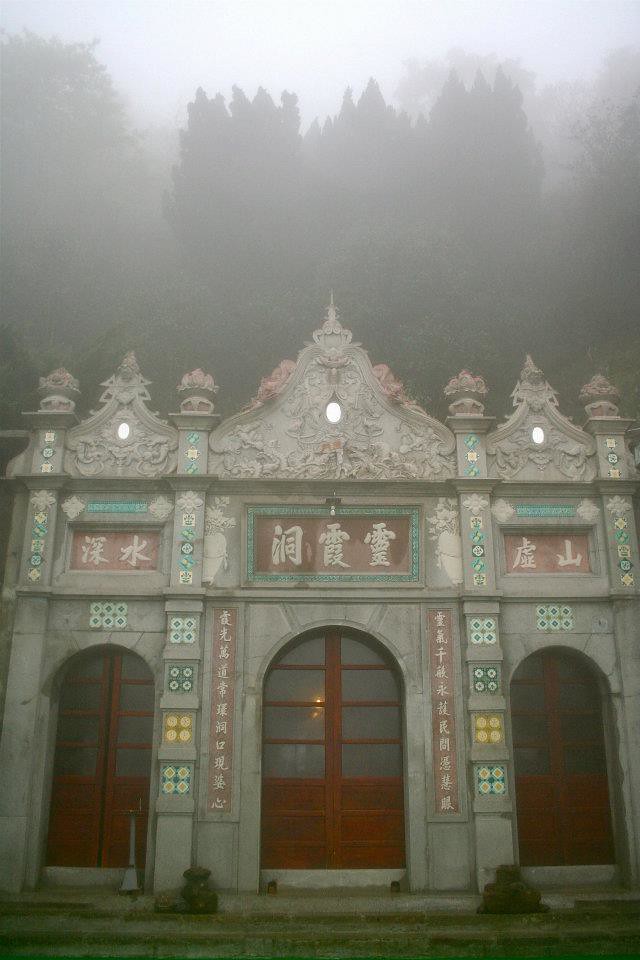 |
| A Japanese-era temple on a creepy, foggy day on Lion's Head Mountain in Hsinchu |
Long and short of it? There's a lot to do in Hsinchu.
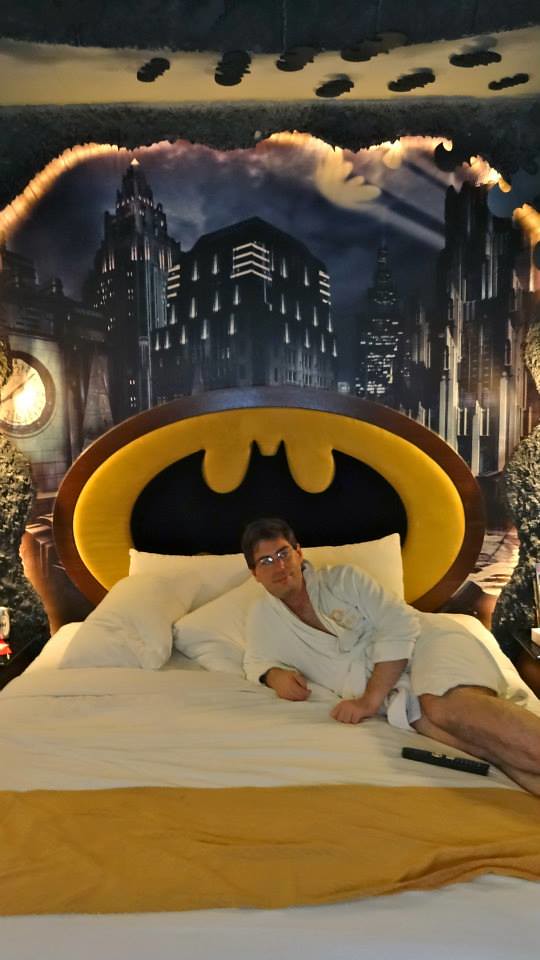 |
| Brendan lookin' sexxxxxxy in the Batman room of a love hotel in Kaohsiung |
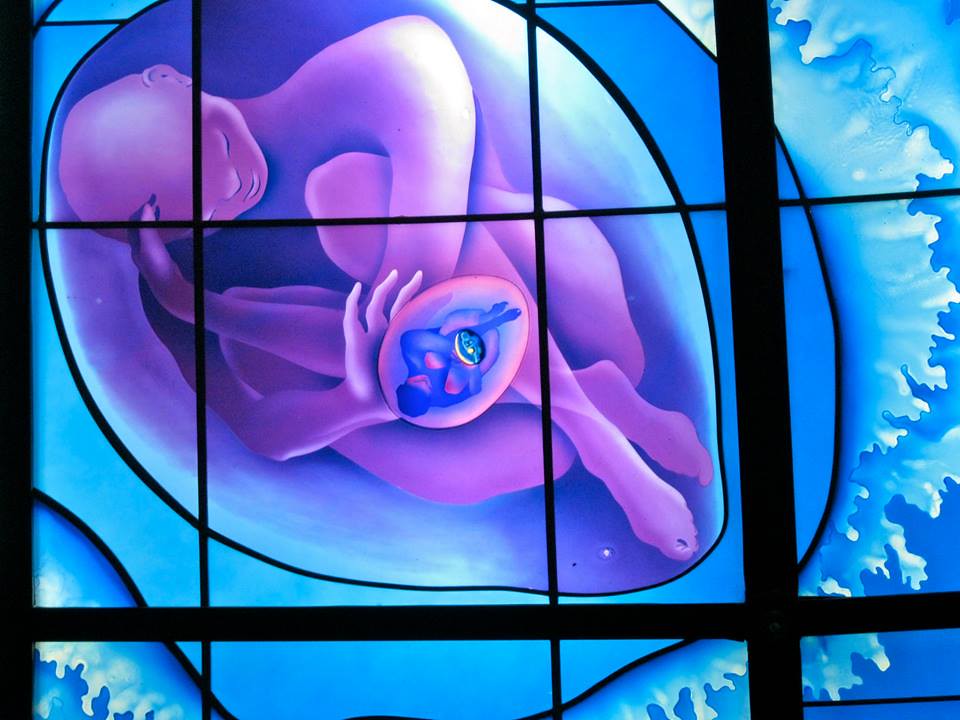 |
| The Dome of Light at Formosa Boulevard station |
That said, enjoy this post about the Batman room at the Eden Exotic Love Hotel in Kaohsiung.
Anyway, I was there for a weekend last month so I'll be fixing that soon. Yes, there are all the things you've heard about: Pier 2, wandering around Hamasen, the British Consulate at Takao (I like to go for the views, that's about it really), Cijin Island, Chaishan and its monkeys, Lotus Lake, Love River, the sugar refinery (which is now a family-friendly tourist spot), Liuhe Night Market. With the exception of the night market, all of this stuff is fine - well, the sugar refinery was a bit bland - and I enjoy it too. By all means, go. Especially Cijin Island, which has great seafood and a fun ferry ride to get you there. I am also a fan of the Dome of Light in Formosa Boulevard station, and in a hallway just off of it, a man who makes sterling silver flower pendants, rings and other charms.
But I like Kaohsiung for its great coffee and food scene, including some fantastic hangouts like Beast (try the sweet potato and cheese quesadillas and Cambridge Cucumber 'mojito'), Reve Coffee and Sojourner Cafe, great burgers at Zzyzx, Takao Beer, a particular cafe on Chaishan that I enjoy, and tons of great local food. I like that it has an MRT so I don't have to taxi everywhere, as I won't rent a car in such a large city. I like Ruifeng Night Market, crowded with locals but almost unknown to tourists. I like hanging out with my friend Sasha in Dashe and eating a whole chicken, gorgeously cooked before walking up Guanyin Mountain.
I'm including Donggang in here because it's a perfect day trip from Kaohsiung. I haven't been to the nearby aquarium, but I can heartily recommend dinner at the harbor (best seafood in Taiwan without going to the outlying islands), Donglong Temple and its magnificent golden gate, a quick walk down the old street, and - again if you can figure out the dates - its King Boat Festival, held every three years, which is worth visiting both at the beginning and the end. Quite possibly the best cultural festival in Taiwan. I wrote my first ever published nonfiction story about it, and you should definitely buy the anthology in which it appears.
Another good choice near Kaohsiung? Meinong. Pretty on-the-tourist-trail, but nice.
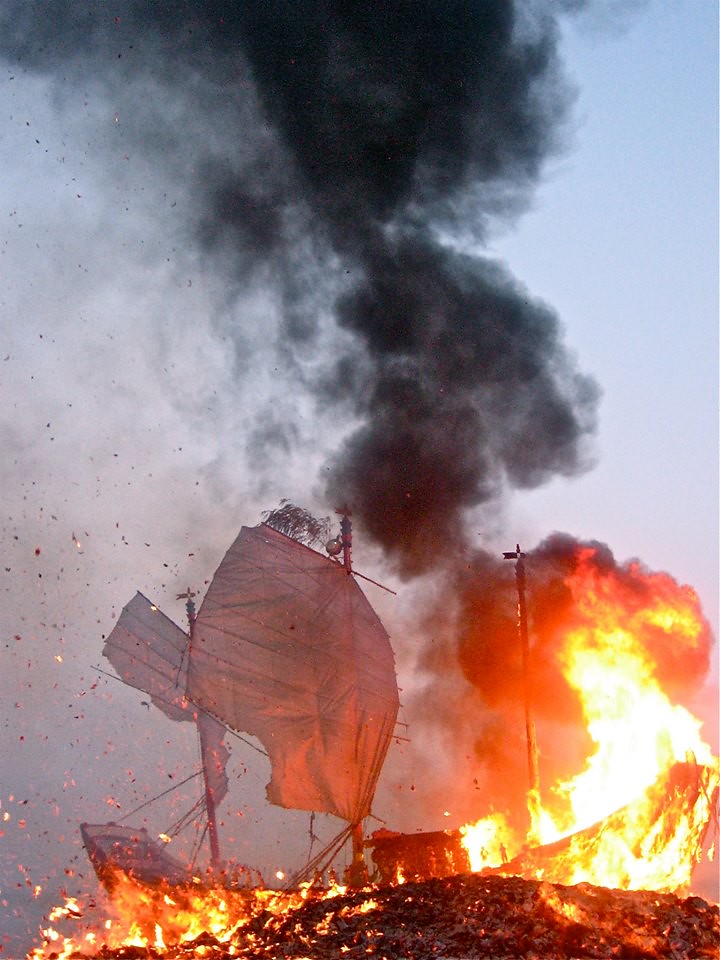 |
| The burning of the King Boat in Donggang |
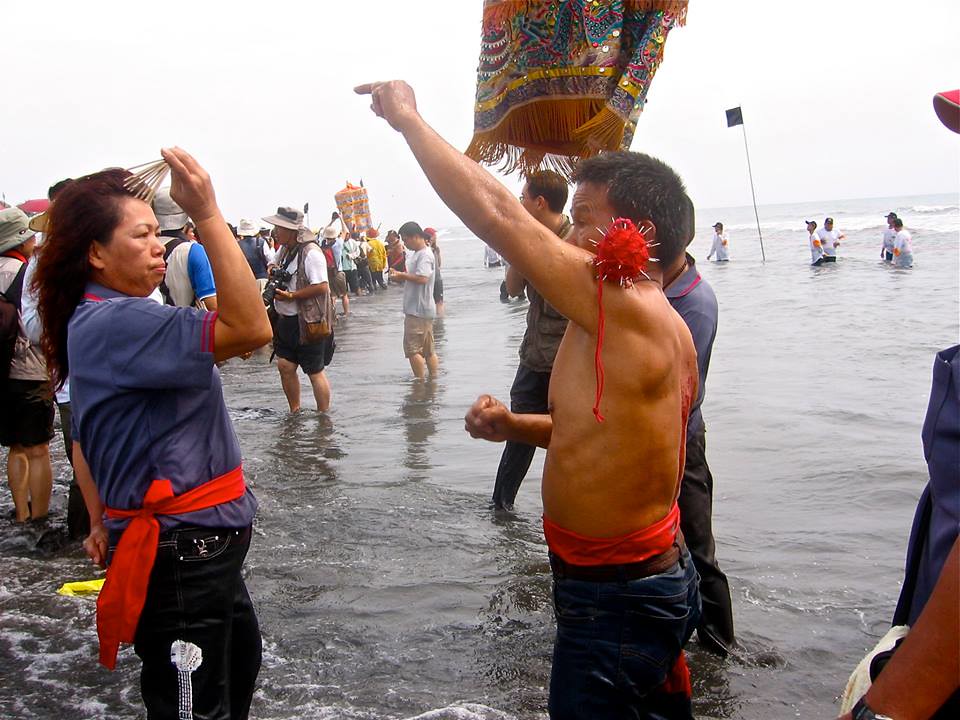 |
| Spirit Mediums in Donggang |
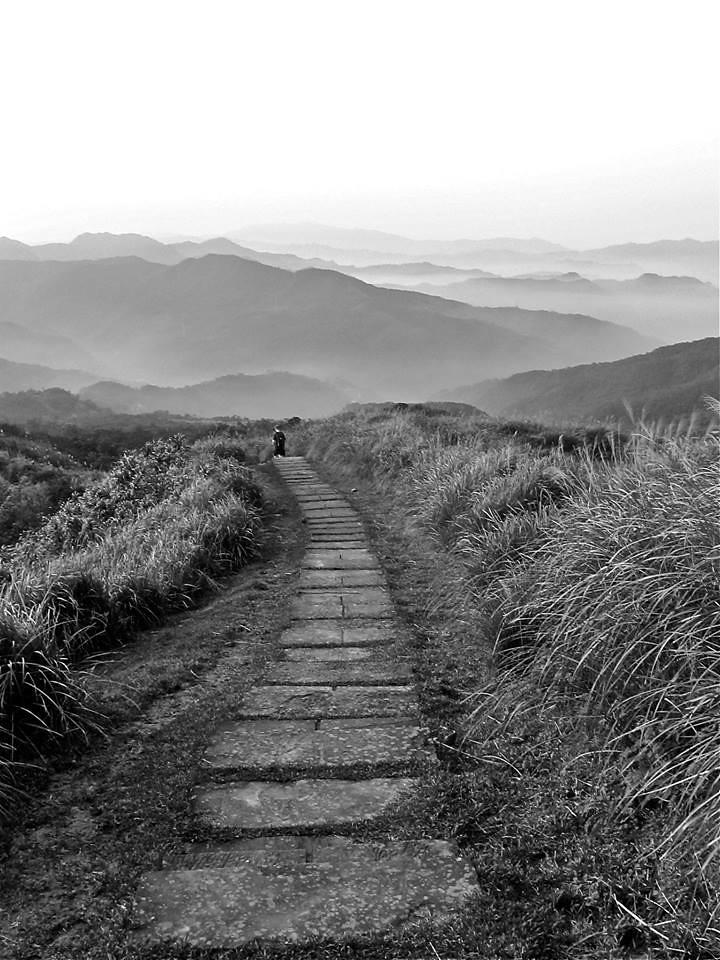 |
| The Taoyuan Grasslands above the Yilan coastline |
There are several hiking trails up here - Yuemeikeng, Caoling Old Trail, Wankengtou and the Taoyuan grasslands (accessible from Caoling Old Trail), and Paoma (Running Horse) Old Trail to name a few. The views? Spectacular. Ever wondered what it was like to walk along a ridge of seaside cliffs with rolling hills to one side and a sheer drop to the waves below at the other? Well, this is it. Probably my biggest "don't miss" set of hiking trails in the entire country.
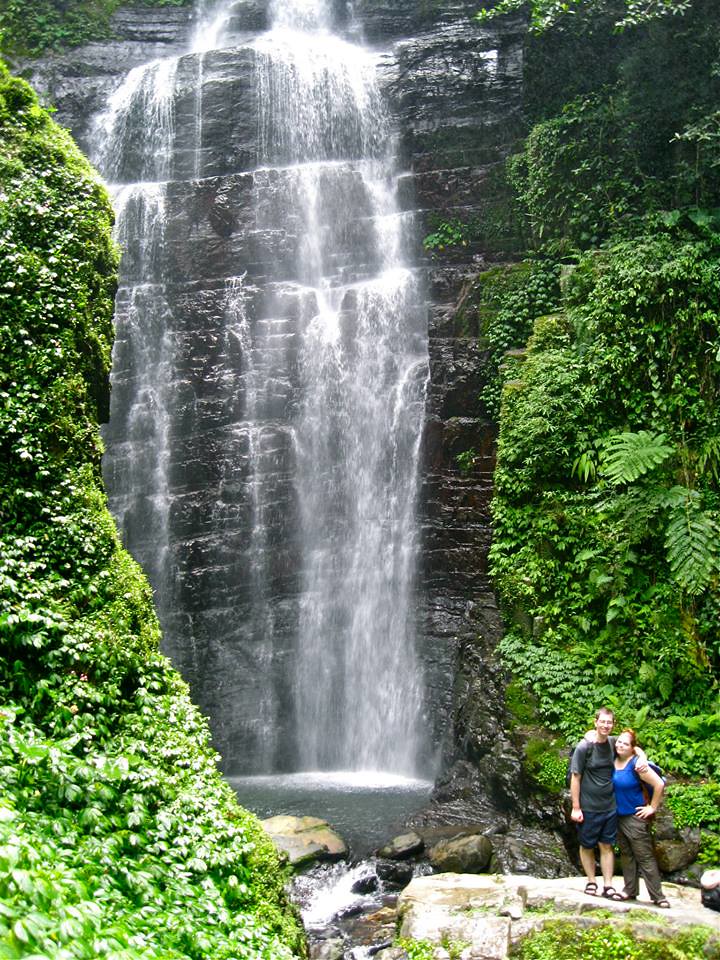 |
| Yuemeikeng waterfall in Yilan - tragically beautiful |
Keelung
No, really, I love hanging out in Keelung. From Heping Island to Miaokou Night Market to the Fairy Cave Temple to Ghost Month, I always enjoy a reason to pass through this - to be honest - kinda grotty town. It's still got the old red light district "welcome sailors!" feeling, it's a bit rough around the edges (okay, at times very rough around the edges) and packed with pachinko parlors, but that's what makes it interesting.
Also, a great stopping-off point from trips to Jiufen and Jinguashi (which are nice, but packed with tourists - for good reason) and my favorite hot springs in Jinshan (in the old Japanese governor-general's hot spring getaway on the coast). Also, a good place to eat after a half day hike up Xiaotzukeng to Jiufen.
 |
| Goats on Orchid Island |
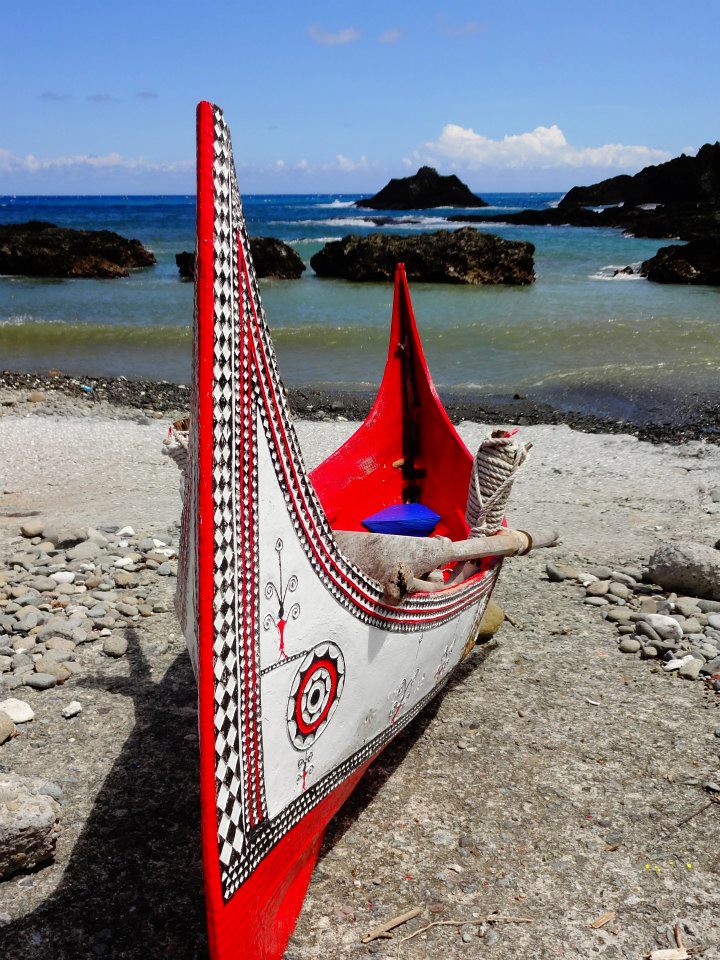 |
| A traditional boat on Orchid Island |
I don't mean to exoticize it that much, I just want to make really clear that Orchid Island is not only nothing like anything you'll find elsewhere, it's also nothing like you'll find in Taiwan proper. It is unique. Don't miss it.
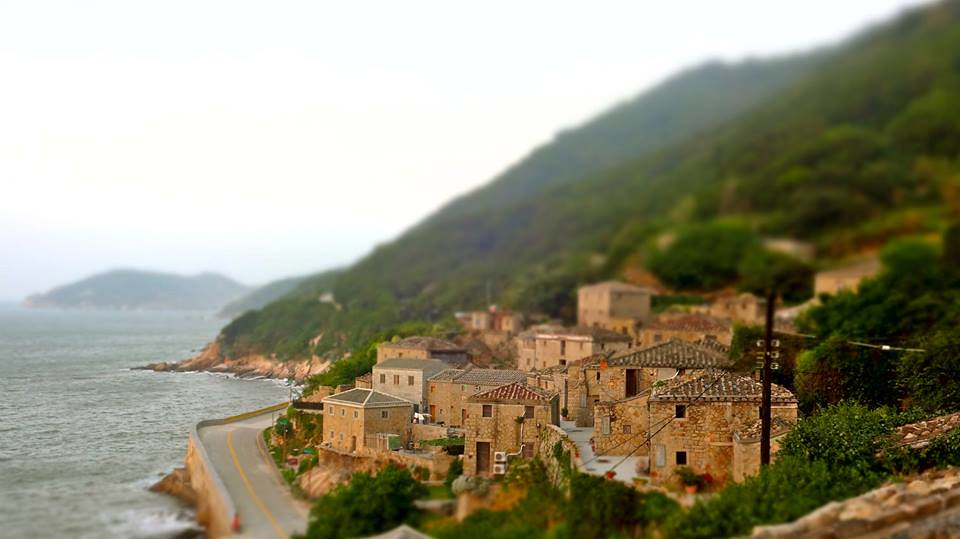 |
| Qinbi, an old stone village, now a nexus of homestay's, on Matsu's northern island of Beigan |
One of my fondest memories of traveling in Taiwan with Brendan was taking off in a car one morning from our homestay on the outskirts of Jincheng with a map that showed the location of every known Wind Lion God statue in Kinmen, and simply driving around to find them (while stopping to enjoy interesting sites we found on the way, which were numerous). Jincheng itself is a wonderful city to wander around, but you don't really get to know Kinmen until you hop in a car and explore its smaller towns, and get a sense of its history - as well as how the major events of history in Asia have shaped it. All the way from the ruined farmhouses, old towns and "foreign mansions" (洋樓) to the Battle of Guningtou to a sad statue of Chiang Kai-shek in a town traffic circle flanked on each side by election posters, at least one for the major opposition party. Mass Murderer, Late Dictator and All-Around Asshat Chiang would be rolling in his grave, and I am happy to know that.
I know I've listed three sets of outlying islands now, and I'd actually like to list Penghu too, but I went in my first year in Taiwan, didn't know much about traveling in Taiwan, and don't remember much either. I'll have to go back, see if I can do a better job of it, and perhaps add it to this list later.
I know I've listed three sets of outlying islands now, and I'd actually like to list Penghu too, but I went in my first year in Taiwan, didn't know much about traveling in Taiwan, and don't remember much either. I'll have to go back, see if I can do a better job of it, and perhaps add it to this list later.
And I know it's a tourist favorite, but I've gotta say I love Lugang. I really do.
I love the old Ding family home (丁家老宅) with its coffee shop in a side hall. I love the old buildings on Zhongshan Road. I love the old street and its cafes in restored houses. I love the festivals at the Matsu temple. I love the old Longshan Temple at the other end of town. I love fried oysters. Hate me if you must, but I love Lugang and I am not afraid to admit it.
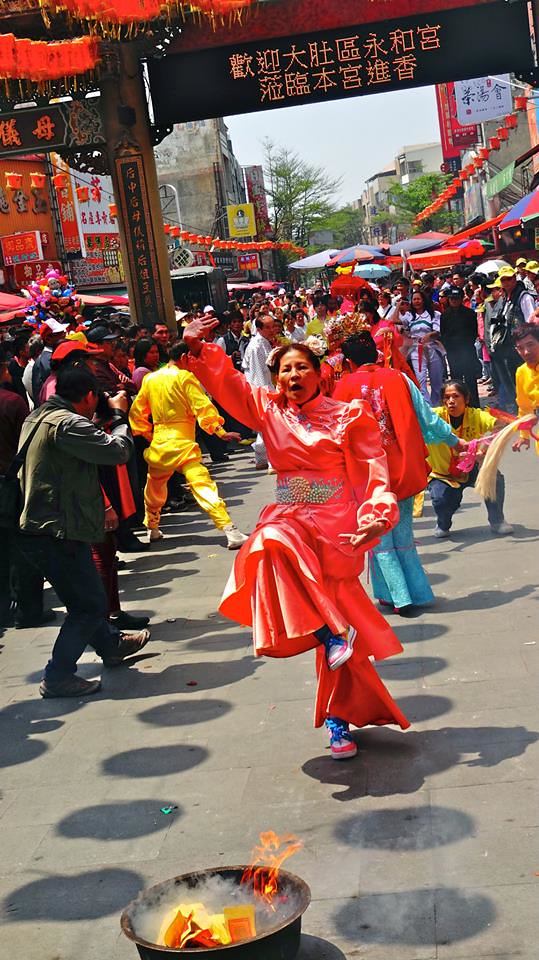 |
| A woman becomes a spirit medium in Lugang |
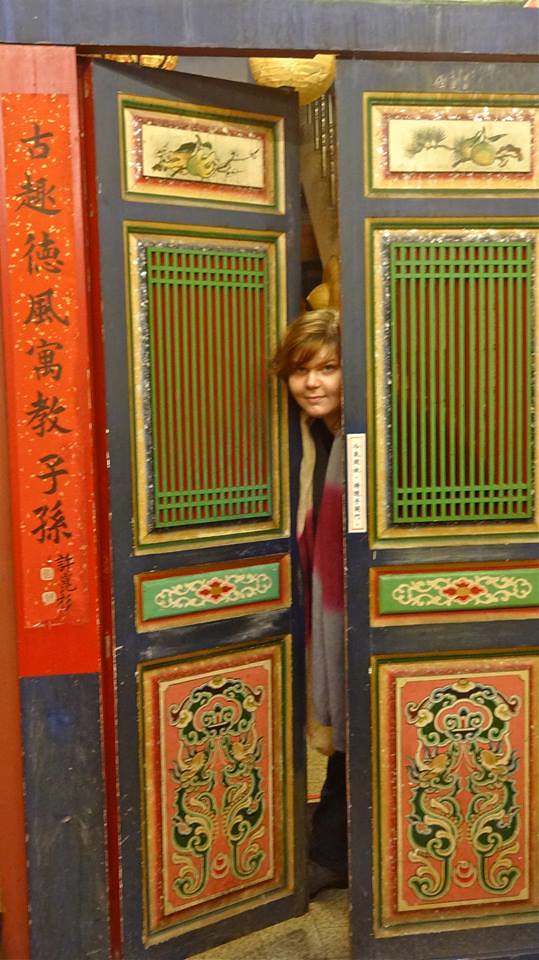 |
| At a cafe in Lugang |

